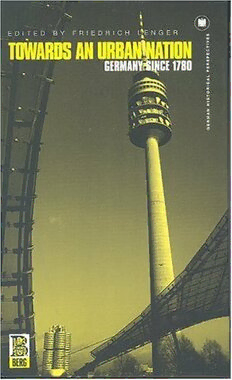
Towards an Urban Nation: Germany since 1780 PDF
Preview Towards an Urban Nation: Germany since 1780
Towards an Urban Nation German Historical Perspectives Series General Editors: Gerhard A. Ritter and Anthony J. Nicholls Volume I Population, Labour and Migration in 19th- and 20th-Century Germany Edited by Klaus J. Bade Volume II Wealth and Taxation in Central Europe: The History and Sociology of Public Finance Edited by Peter-Christian Witt Volume III Nation-Building in Central Europe Edited by Hagen Schulze Volume IV Elections, Parties and Political Traditions: Social Foundations of German Parties and Party Systems Edited by Karl Rohe Volume V Economic Crisis and Political Collapse: The Weimar Republic, 1924–1933 Edited by Jürgen Baron von Kruedener Volume VI Escape into War: The Foreign Policy of Imperial Germany Edited by Gregor Schöllgen Volume VII German Unification: The Unexpected Challenge Edited by Dieter Grosser Volume VIII Germany’s New Position in Europe: Problems and Perspectives Edited by Arnulf Baring Volume IX Western Europe and Germany: The Beginnings of European Integration 1945–1960 Edited by Clemens Wurm Volume X The Military in Politics and Society in France and Germany in the Twentieth Century Edited by Klaus-Jürgen Müller Volume XI Culture in the Federal Republic of Germany, 1945–1995 Edited by Reiner Pommerin Volume XII The Problem of Revolution in Germany, 1789–1989 Edited by Reinhard Rürup Volume XIII Science in the Third Reich Edited by Margit Szöllösi-Janze Volume XIV The Third Reich Between Vision and Reality Edited by Hans Mommsen Volume XV The Divided Past: Rewriting Post-war German History Edited by Christoph Kleßmann German Historical Perspectives/XVI Towards an Urban Nation Germany since 1780 Edited by FRIEDRICH LENGER Oxford•New York First published in 2002 by Berg Editorial offices: 150 Cowley Road, Oxford, OX4 1JJ, UK 838 Broadway, Third Floor, New York, NY 10003-4812, USA © Friedrich Lenger 2002 All rights reserved. No part of this publication may be reproduced in any form or by any means without the written permission of Berg. Berg is the imprint of Oxford International Publishers Ltd. Library of Congress Cataloging-in-Publication Data A catalogue record for this book is available from the Library of Congress. British Library Cataloguing-in-Publication Data A catalogue record for this book is available from the British Library ISBN 185973586X(Cloth) Typeset by JS Typesetting, Wellingborough, Northants. Printed in the United Kingdom by Biddles Ltd, Guildford and King’s Lynn. Contents Editorial Preface Gerhard A. Ritter andAnthony J. Nicholls vii Acknowledgements ix Introduction: Urban History and the History of Urbanization in Germany Friedrich Lenger 1 Urbanization and the Spread of an Urban Culture in Germany in the Nineteenth and Twentieth Centuries Klaus Tenfelde 13 Burgher Cities on the Road to a Civil Society: Germany 1780 to 1870 Gisela Mettele 43 Burghers and other Townspeople – Social Inequality, Civic Welfare and Municipal Tasks during Nineteenth-Century Urbanization Sylvia Schraut 69 Building and Perceiving the City: Germany around 1900 Friedrich Lenger 87 Normal Pollution: Industrialization, Emissions and the Concept of Zoning in Germany, 1800–1970 Franz-Josef Brüggemeier 107 Urban Society and Urban Politics in Germany between the Wars Hans-Ulrich Thamer 127 Urban Reconstruction and Urban Development in Germany after 1945 Axel Schildt 141 Three Cities, Three City Models – Urban Development: Perspectives for the Twenty-first Century Stefan Zappe 163 Notes on Contributors 185 This page intentionally left blank Editorial Preface The purpose of this series of books is to present the results of research by German historians and social scientists to readers in English-speaking countries. Each of the volumes has a particular theme that will be handled from different points of view by specialists. The series is not limited to the problems of Germany but will also involve publications dealing with the history of other countries, with the general problems of political, economic, social and intellectual history as well as international relations and studies in comparative history. We hope the series will help to overcome the language barrier that experience has shown obstructs the rapid appreciation of German research in English-speaking countries. The publication of the series is closely associated with the German Visiting Fellowship at St Antony’s College, Oxford, which has existed since 1965, having been originally funded by the Volkswagen Stiftung, later by the British Leverhulme Trust, by the Ministry of Education and Science in the Federal Republic of Germany, and starting in 1990, by the Stifterverband für die Deutsche Wissenschaft with special funding from C. & A. Mode Düsseldorf. Each volume is based on a series of seminars held in Oxford, which has been conceived and directed by the Visiting Fellow and organized in collaboration with St Antony’s College. The editors wish to thank the Stifterverband für die Deutsche Wissenschaft for meeting the expenses of the original lecture series and for generous assistance with the publication. They hope that this enterprise will help to overcome national introspection and to further international academic discourse and co-operation. Gerhard A. Ritter Anthony J. Nicholls vii This page intentionally left blank Acknowledgements The present volume originated in a series of lectures organized at the European Studies Centre of St Antony’s College in Oxford in Hilary Term 1998. I am most grateful to the Warden and Fellows of St Antony’s and to the Stifterverband für die Deutsche Wissenschaft who enabled me to spend the academic year 1997/8 as a visiting fellow in Oxford and thus provided the opportunity for organizing a seminar on German urbanization. Amongst the many people who were responsible for my friendly reception at St Antony’s and for a highly stimulating intellectual environment I would like to single out Anthony J. Nicholls, Director of the European Studies Centre, whose cordial support was crucial. Here in Giessen Renate Lange, Justin Salisbury and above all Dr Rainer Liedtke took over a considerable part of the editorial work. I owe thanks to them as well as to Melanie Aspey (London) who assisted with the language correction of the English texts. I should like to express my gratitude to the Justus-Liebig-Universität Giessen for funding her work. Friedrich Lenger Giessen ix
